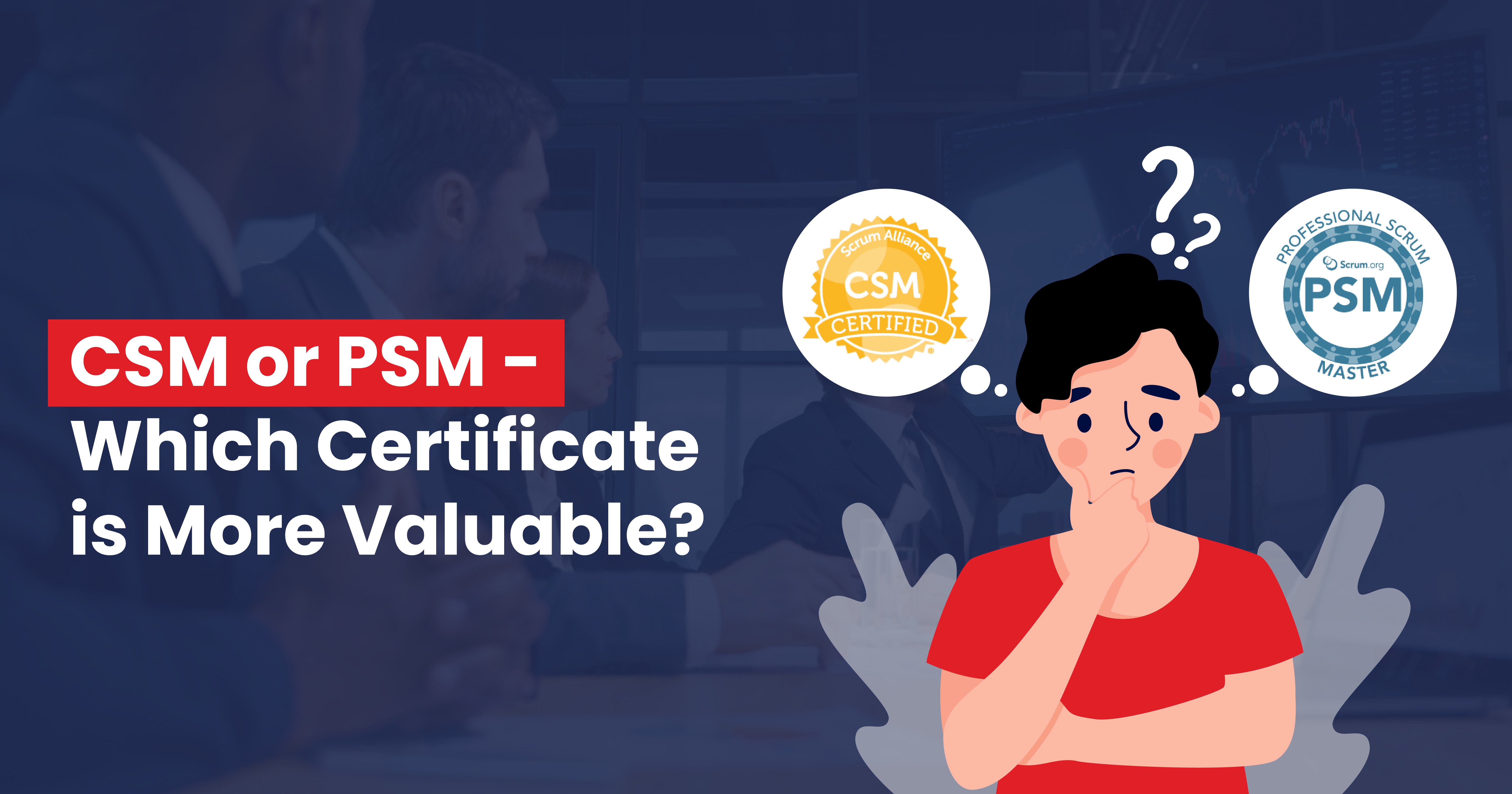In the ever-evolving world of software development and project management, certifications play a crucial role in validating the skills and knowledge of professionals. Among the most recognized certifications are the Certified ScrumMaster (CSM) and Professional Scrum Master (PSM) certifications. These certifications are highly sought after by individuals looking to excel in agile project management, but which one is more valuable? In this article, we will explore the CSM and PSM certifications, compare them across various dimensions, and help you make an informed decision.
CSM and PSM Certifications
Before diving into the comparison, let's briefly get to know about both certifications.
What is a Certified Scrum Master (CSM)?
- Issued by: Simpliaxis (Registered Education Provider for the scrum alliance)
- Prerequisites: None
- Training Requirement: Yes, a two-day CSM training course
- Exam Format: A 35-question multiple-choice test
- Renewal Requirement: A $100 renewal fee every two years
- Focus: The CSM® certification emphasizes the Scrum framework and its practical application in teams.
Comprehensive training and mentoring to build a solid foundation of Scrum knowledge through Advanced Master Scrum certification.
What is a Professional Scrum Master (PSM)?
- Issued by: Simpliaxis (Registered Education Provider for the scrum alliance)
- Prerequisites: None, but experience with Scrum is recommended
- Training Requirement: No official training requirement, although training is available
- Exam Format: A rigorous 80-question multiple-choice test
- Renewal Requirement: No renewal fee; the certification does not expire
- Focus: PSM certifications focus on understanding the Scrum framework deeply and applying it in complex situations.
Unlock your full potential in Agile project management. Pursue a Professional Scrum Master certification and pave your way to expertise in Agile Project Management.
Key Dimensions of Comparison
To determine which certification is more valuable, we'll evaluate them across several dimensions that matter to professionals seeking to enhance their careers and skills.
Certifying Body and Reputation
CSM: Issued by Scrum Alliance, CSM has been around for a long time and has a significant presence in the agile community. It is well-regarded by many organizations.
PSM: Scrum.org is the body behind PSM certifications, founded by one of the creators of Scrum, Ken Schwaber. This lends PSM a strong reputation for adhering closely to Scrum principles.
Which is better? Both have reputable certifying bodies, making this a tie.
Training Requirement
CSM: Requires a two-day training course, which can be beneficial for newcomers to Scrum.
PSM: No official training requirement, giving you flexibility in choosing your preparation method.
CSM provides structured training, but PSM allows more flexibility.
Exam Difficulty
CSM: A 35-question multiple-choice test, considered less challenging by some due to the lower question count.
PSM: An 80-question multiple-choice test with a higher level of difficulty, requiring a deeper understanding of Scrum.
Which is more difficult? CSM is more challenging, which can be seen as a testament to its depth.
Renewal Requirement
CSM: Requires a $100 renewal fee every two years, along with continuing education units (CEUs) to maintain certification.
PSM: No renewal fee; the certification does not expire.
Which is better? PSM offers long-term certification without the need for renewal.
Focus and Content
CSM: Focuses on the practical application of Scrum in team settings, making it suitable for Scrum Masters and team members.
PSM: Emphasizes a deep understanding of the Scrum framework, making it valuable for Scrum Masters, Product Owners, and anyone involved in complex Scrum implementations.
Verdict: PSM provides a deeper understanding of Scrum principles, making it more versatile.
Value in the Job Market
The value of a certification often depends on its recognition and demand in the job market. To assess this, we can look at job listings and salary data. Below are a couple of tables summarizing this information:
Average Salaries
Certification | Average Salary (USD) |
CSM | $95,000 |
PSM | $105,000 |
From the data presented in the table above, it's evident that both CSM and PSM certifications are in demand in the job market. PSM, however, tends to command slightly higher average salaries, indicating its perceived value in the eyes of employers.
CSM or PSM Which Certification Should You Choose?
The choice between CSM and PSM ultimately depends on your career goals, experience, and preferences.
Choose CSM if:
- You are new to Scrum and want a structured introduction.
- Your primary role is that of a Scrum Master or team member.
- You value the opportunity to renew your certification regularly to stay updated.
Choose PSM if:
- You have some experience with Scrum and want to deepen your understanding.
- You are involved in complex Scrum implementations or product ownership.
- You prefer a one-time certification without renewal fees.
Lastly!
In the debate between CSM and PSM, there is no clear winner. Both certifications have their strengths and cater to different needs. CSM provides a good entry point for newcomers, while PSM offers a deeper dive into Scrum principles and is favored for more complex Scrum environments.
Ultimately, the choice should align with your career goals and the depth of Scrum knowledge you seek. Whichever certification you choose, it's important to remember that success in agile project management goes beyond a piece of paper. Continuous learning, practical experience, and a commitment to Scrum principles are equally important in building a successful career in this field.













 +1-361-998-9988
+1-361-998-9988


